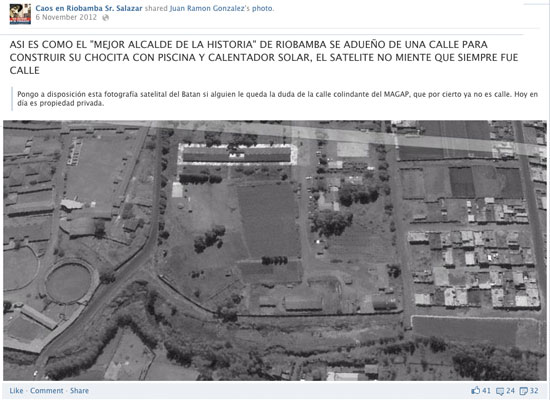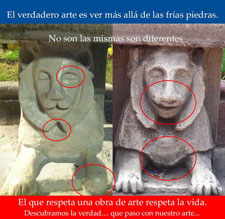You'd be forgiven for thinking that after writing the university's Code of Ethics for its journalism course and having 95 per cent of his students back him by petition, Ignacio Ramos Mancheno would still have his job.
Not so. The popular journalism lecturer at the National University of Chimborazo in Ecuador, and news radio host, discovered the reality of press freedom in Ecuador the hard way.
In a RioFM magazine article entitled, “More damage done by an idiot than an earthquake”, Mancheno publicly criticised the city's mayor, Juan Salazar Lopez, when municipal contract workers with crowbars clumsily destroyed the heritage-listed lion statues of Riobambas' famous plaza, the Parque Sucre.
“All of the municipal machinery and compromised communication mediums with them could not counter the public opinion of Riobamba, and the movement of its citizens, because of only one radio [station]“RioFM” and the active users of social networks.” writes Mancheno.
A few weeks later he was fired without reason. Soon afterwards Mancheno was “let go” as director of news at RioFM, the city's last independent radio station.
Bullied into submission by fear of Mancheno's removal, the local press stopped publishing potentially embarrassing articles about the mayor.
Highly-paid government official Roberto Chiriboga was later appointed to a popular local TV news program. Salazar became a regular guest and his mayorship was described as visionary and progressive – he had successfully stifled the local media.
The city's discontent had been contained to scrawls of guerilla graffiti and popular jokes. In one, a man from the city of Guayaquil, taking a taxi through Riobamba, asks the swerving driver why the road is full of potholes.
“Because our dear mayor dreamed the lost gold of the last Incan king Atahualpa is buried beneath the streets," the driver replies.
Unemployed and with no local media willing to give him a job, Mancheno teamed up with freelance video producer Juan Ramon Gonzalez and, in the proud tradition of South American resistance, they began reporting the news the local press refused over social media.
“Social media is an incredibly powerful tool,” Mancheno told New Matilda. “We only post what we can prove with documented evidence like copies of municipal contracts because the moment we don't, they've got us.”
In January last year, Mancheno and Gonzalez helped organise a protest on Facebook to stop the construction of a road over a public plaza next to the city's crumbling cathedral. Construction was halted but the price of success was high: two weeks later, between midnight and dawn on a Saturday, eight businesses belonging to the protesters were closed without reason.
Gonzalez's video production studio was also targeted. “The municipal government came to close our stores like thieves in the night,” he said.
Undaunted by the setback, the mayor arbitrarily ordered a little-known public road known as Batán to be appropriated and sealed to conceal the construction of his private villa. The mayor denied the road existed, but an archived satellite image shared on social media showed the road and proved the mayor wrong.
It gained the attention of the Ecuadorian offshoot of Anonymous who commented: “This is how the best mayor in the history of Riobamba appropriated a road to construct his little hut with a solar heated pool. The satellite doesn't lie, it was always a road.”

The movement to increase transparency and accountability in Riobamba is leaderless by design to prevent Salazar from going after any one person. But activists don't work in isolation. Even those who prefer to investigate the mayor under the cover of anonymity are surprisingly connected, and often share their findings.
For instance, transparency initiatives implemented by President Rafael Correa's “Citizens' Revolution” allowed activists to obtain a photocopy of the $32,000 contract to design the city's logo.
The logo was sent to a mailing list of over 200 people representing every corner of Riobamban society. Crowd-sourced journalism revealed the image was plagiarised, as was the slogan “Everything Starts Here” — which was copied word for word from the country's largest cellphone company Movistar.

The $32,000 contract, over triple the yearly wage of the average Ecuadorian, was awarded to Juan Salazar's godson by marriage, Danilo Villaroel, who produced a program praising the municipal government on local TV stations Ecuavision and TVS.
The municipal government shamelessly changed their slogan to “Efficiency and Transparency Here” after an image comparing the plagiarised slogans was shared on social networks.
Disturbed by the growing power of citizen journalism in the city, the municipality founded the Facebook page “Riobamba al Dia” in September last year. Suddenly a small army of recently created Facebook profiles began sharing municipal news attacking anyone critical of the mayor.
When Gonzalez and Mancheno enter their names into the National Electoral Registry database, the profiles are consistently revealed to be fakes involved in what is now commonly called “sockpuppeting”.
“The trolls message me on Facebook calling me names and threatening me,” says Gonzalez. He has received death threats in the past.
Another example: Last year the famous Spanish bullfighter Fandi was flown to Riobamba in an event televised on local TV channels. What their coverage omitted was shouts of “no shame” and “get out” when Fandi embraced Salazar after the match, later revealed in a video uploaded to YouTube.
This lack of balance was one of the reasons Paul Gonzalez, another local journalist, resigned from his TV program to pursue citizen journalism. “Now media is not about how to inform and misinform, it has transformed into how to defend yourself and attack,” he said.
His independent news show, From the Livingroom, is aired on www.rioenred.com at a set time before being released to Youtube and aims to be more balanced than local TV. “It's possible to make quality programs without many resources and use social networks as a distribution medium,” Paul Gonzalez adds.
Diego Villacis studied architecture and urban planning in Italy and helps guide protestors in Riobamba. “The voice of the city is in the plaza, not on television,” he says, tapping a photo of the Plaza de Independencia, in the Ecuadorian capital Quito.
“In times of revolution, we see the people go back to the plaza to retake the fundamental values of the city.”
In January this year, a major protest, Signatures for Dignity, was staged at Riobambas’ Parque Sucre. Named after the revolutionary Antonio José de Sucre, who led the city to independence from the Spanish in the Battle of Riobamba, the plaza had recently become a potent symbol of corruption.
The protest was in response to restoration works that closed the plaza for eight months and cost US$530,000 (the US dollar is Ecuador's currency). Once reopened, the only discernible difference was that the park’s 52 lion statues, each handcrafted by an Italian stonemason in 1922, had been switched with mass-produced duplicates.
 To dampen the potential fallout from the protest the mayor's Facebook platform commented, “Friends, with all due respect, do not permit yourself to be manipulated, the institutions that watched over our park, assure us that everything done conformed with the requirements of the Institute of Patrimony.”
To dampen the potential fallout from the protest the mayor's Facebook platform commented, “Friends, with all due respect, do not permit yourself to be manipulated, the institutions that watched over our park, assure us that everything done conformed with the requirements of the Institute of Patrimony.”
Meanwhile a barrage of tweets and images were being blasted over social media rallying everyone within reach to the protest. “Overcome fear Riobambans,” said Anonymous the night before the protest, “put a stop to those who steal our dreams of a proud and progressive city, because we were not born with the souls of slaves.”
Almost 3,000 signatures were collected from a wide range of demographics — demonstrating widespread support outside of social networks. The protest also encouraged some press outlets to cease self-censorship. “Now we can say there is an independent press,” commented Anonymous, uploading the front page article from the newspaper Diario de los Andes entitled: “Social Groups Demand Efficiency and Transparency”
“In former times revolution was never made in the office, it was made in the streets.” says Gonzalez. “Now thanks to social networks the revolution starts in the office and ends in the street."
This is the first of two articles by Paris Ling on social media in Riobamba. In part two, published Thursday, citizen journalists and Anonymous "put corruption where it belongs".
Donate To New Matilda
New Matilda is a small, independent media outlet. We survive through reader contributions, and never losing a lawsuit. If you got something from this article, giving something back helps us to continue speaking truth to power. Every little bit counts.



